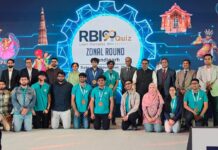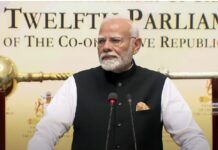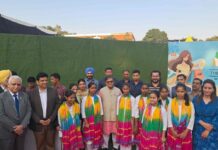Panel discussion on leadership with inter-disciplinary experts held at PGIMER Chandigarh
“Leadership and management training should be integral to a medical institute”, said Shri Kumar Gaurav Dhawan, Deputy Director Administration, PGIMER, Chandigarh, during the panel discussion held in 21st International Public Health Management Development Program for Myanmar Officials being organised by Department of Community Medicine, PGIMER Chandigarh. During the panel discussion, the need for good leaders in health and health-related sectors were recognised, as there are very few formal leadership and management trainings for medical professionals. The leadership skills demonstrated by doctors during COVID 19 with limited resources is testimony of the fact that these skills are of utmost importance, Mr Dhawan said while suggesting for formal trainings of 3-4 weeks on leadership and management at his institute. The panel discussion on inter-sectoral collaboration in health was moderated by Dr. Sonu Goel, Program Director and Professor at the Department of Community Medicine and School of Public Health, PGIMER, Chandigarh. During the panel discussion, delegates interacted with the experts from the field of environmental health, Dr. Khaiwal, Professor PGIMER; nutritional health, Dr. Poonam Khanna, Professor PGIMER; tobacco control and NCD, Dr. Rakesh Gupta, President SIPHER; health and administration, Mr. Kumar Gaurav Dhawan; health and academic collaboration, Mr. Yajvender Pal Verma, Registrar of Panjab University and role of media in health expert Ms. Naina Mishra, Tribune correspondent.
The panellists shared their success stories on efficient leadership with the participants. When Professor Goel asked Ms. Naina Mishra to give key insights about the leadership role of media in health promotion, she briefed that media played key role in lobbying the government to maintain the institution’s health insurance programme for the underprivileged. She told that media have played a vital role in allaying of myths during COVID times and shouldn’t be avoided by professionals. During the discussion, Dr. Khaiwal, told the participants that the goal of an institute should be to cater to the weakest person in the community. He shared the leadership role of PGIMER and MOHFW in documenting health adaptation plan for the country, which can be replicated in Myanmar. Dr. Poonam Khanna emphasized upon the leadership role played by India in implementing Front of Package labelling which will be highly effective in controlling burden of NCDs. Mr Verma stated how Punjab University has been promoting holistic health to the students and faculty. He told that entrepreneurship and inter-sectoral collaboration are key to rise of any institute. Involving diverse sectors and promoting health through collaboration is the need of hour, all panellist echoed while praising IPHMDP which was commenced in the year 2016 and had trained over 1000 high level officials of 85 countries.
Mr. Vivek Atray, during his technical session, talked about how to keep up the motivation and morale personally as well as professionally. He laid emphasis on certain key messages which presented the bigger picture to handle stress in a better way by maintaining a calmer demeanor. Dr. Sonu Goel, during his session on Behaviour Change Communication and Advocacy in improving program effectiveness, the participants performed a role play in which one participant was blind folded and was instructed verbally by the second participant to reach the third participant and give rose to her. While referring to the role play, he explained how due to ineffective communication, the service does not reach the beneficiary, and then went on to describe the main five components of successful communication which included credibility of message source and design, delivery channel, target audience and targeted behaviour.
“This flagship programme in public health has galvanised South-South development cooperation with 161 ITEC countries in Asia, Africa, East Europe, Latin America, the Caribbean and Pacific and Small Island countries under the ancient Indian philosophy “Vasudeva Katumbakam,” i.e., world is one family.” Dr. Goel, said. This 10 day program adopted a unique methodology of gamification where the delegates were taught using management and leadership games and exercises besides peer-to-peer learning. The participants shall also visit Shimla for 3 days to witness good practices in public health sector in the country.
















